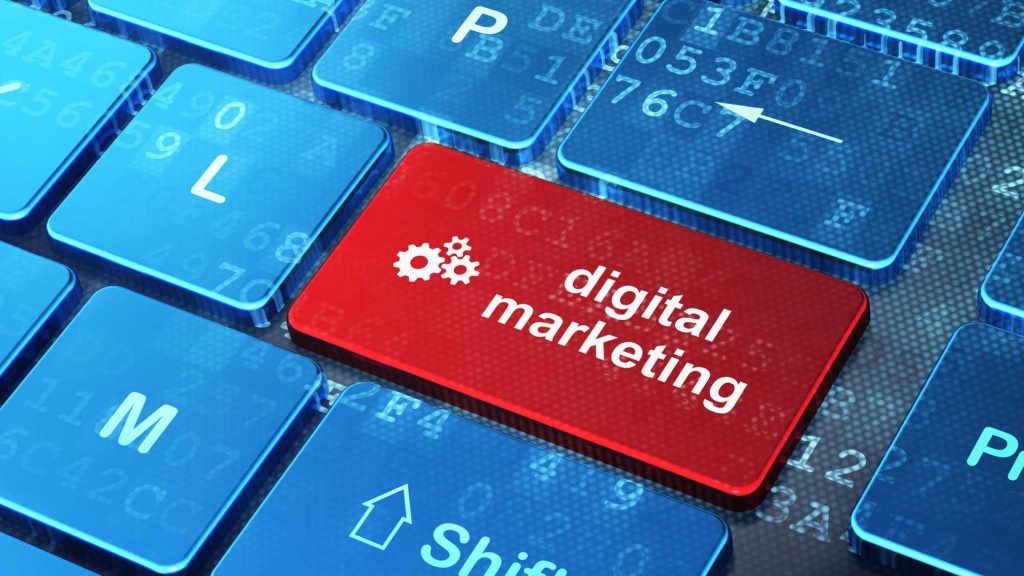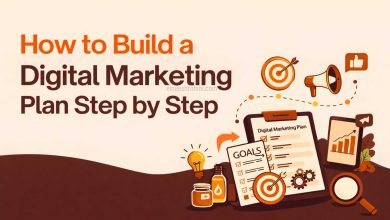Top Digital Marketing Trends for 2025 : Comprehensive Guide
Digital Marketing Trends : The digital marketing landscape is constantly evolving, driven by technological advancements, changing consumer behaviors, and the rise of new platforms. As businesses strive to stay relevant and competitive, staying ahead of trends becomes crucial.
Table of Contents
The year 2025 promises to be transformative, with innovations reshaping how brands connect with audiences. This essay delves into the top digital marketing trends that are expected to dominate in 2025, helping businesses prepare for the future.
1. Artificial Intelligence (AI) Revolutionizing Marketing

Artificial Intelligence (AI) has already made significant inroads in digital marketing, but by 2025, its influence is set to reach unprecedented levels.
Also Read : Types of Digital Marketing
AI-driven tools are expected to dominate areas like content creation, customer service, and personalized marketing.
- Hyper-Personalization: AI algorithms will analyze user data to deliver highly personalized experiences. From tailored emails to dynamic website content, brands will leverage AI to ensure every interaction feels unique.
- AI Chatbots and Voice Assistants: Customer service will rely heavily on AI chatbots capable of providing real-time, human-like assistance. These bots will integrate with voice assistants like Alexa and Google Assistant, offering seamless, conversational experiences.
- Predictive Analytics: AI will help marketers anticipate consumer needs by analyzing historical data and predicting future behavior. This will enable businesses to optimize campaigns and offer products or services at the right time.
2. Rise of Metaverse Marketing
The metaverse—a virtual, immersive world where people can interact, work, and play—is emerging as a game-changing platform for marketers. By 2025, the metaverse is expected to become mainstream, offering limitless opportunities for brand engagement.
- Virtual Storefronts: Businesses will establish virtual shops in the metaverse, where customers can browse products, try them out virtually, and make purchases without leaving the digital environment.
- Immersive Experiences: Marketers will create engaging experiences like virtual concerts, product launches, and interactive games to capture consumer attention.
- NFT Marketing: Non-fungible tokens (NFTs) will play a key role in building brand loyalty. Limited-edition virtual goods and collectibles will drive engagement and revenue in the metaverse.
3. Expansion of Voice Search and Voice Commerce
With the growing adoption of smart speakers and voice-enabled devices, voice search and voice commerce will become even more prevalent by 2025.
- Optimizing for Voice Search: Marketers will prioritize creating content that aligns with voice search queries. This includes using conversational language and focusing on long-tail keywords.
- Voice-Activated Shopping: Voice commerce will see exponential growth as consumers become more comfortable making purchases through voice assistants. Brands will need to optimize their e-commerce platforms for voice transactions.
- Local SEO for Voice Search: Local businesses will capitalize on voice search by optimizing their online presence for “near me” queries, ensuring they appear in location-specific voice searches.
4. Video Marketing Dominance
Video content continues to be a powerful medium for engagement, and by 2025, it will dominate digital marketing strategies.
- Short-Form Videos: Platforms like TikTok, Instagram Reels, and YouTube Shorts have popularized short-form video content. Marketers will increasingly use these formats to capture the shrinking attention spans of consumers.
- Interactive Videos: Shoppable videos, where viewers can click on products and make purchases directly, will gain traction. This blend of content and commerce will enhance user engagement.
- Live Streaming: Live videos will remain popular for product launches, Q&A sessions, and real-time interactions. They offer authenticity and foster deeper connections with audiences.
5. Sustainable and Purpose-Driven Marketing
As consumers become more environmentally conscious, brands will prioritize sustainability and social responsibility in their marketing efforts.
- Green Marketing: Highlighting eco-friendly practices, sustainable sourcing, and waste reduction will resonate with environmentally aware audiences.
- Corporate Social Responsibility (CSR): Brands will align themselves with causes that matter to their target audience, such as climate change, diversity, and community development.
- Transparency and Authenticity: Consumers will demand greater transparency regarding a brand’s values, practices, and environmental impact. Authentic storytelling will play a crucial role in building trust.
6. Programmatic Advertising Evolution
Programmatic advertising—using AI to automate ad buying—will evolve further by 2025, becoming more precise and efficient.
- Cookieless Advertising: With the phasing out of third-party cookies, marketers will rely on first-party data and AI-driven insights to target audiences effectively.
- Contextual Advertising: Ads will be placed based on the context of the content, ensuring relevance and improving user experience.
- Real-Time Bidding (RTB): Programmatic platforms will enable advertisers to bid for ad space in real time, optimizing campaigns for maximum ROI.
7. Growth of Influencer Marketing
Influencer marketing will continue to thrive, but its approach will shift significantly by 2025.
- Nano and Micro-Influencers: Brands will prioritize partnerships with smaller influencers who have highly engaged niche audiences, offering better ROI than macro-influencers.
- AI-Powered Influencer Selection: AI tools will analyze influencer metrics, audience demographics, and engagement rates to identify the best collaborators for specific campaigns.
- Performance-Based Partnerships: Influencer collaborations will move towards performance-based models, where compensation is tied to measurable outcomes like sales and leads.
8. The Era of Zero-Party Data
Data privacy concerns and stricter regulations will push marketers to focus on zero-party data—information voluntarily shared by consumers.
- Interactive Content: Quizzes, polls, and surveys will be used to collect zero-party data while engaging users.
- Loyalty Programs: Brands will incentivize customers to share data through personalized rewards and exclusive offers.
- Privacy-Centric Marketing: Transparency about data usage and robust privacy measures will build consumer trust and encourage data sharing.
9. Enhanced Customer Experiences with Augmented Reality (AR)

Augmented Reality (AR) will transform how brands interact with consumers by offering immersive experiences.
- Virtual Try-Ons: Fashion and beauty brands will use AR to let customers try on clothes, makeup, and accessories virtually.
- Interactive Packaging: AR-enabled packaging will allow customers to scan products and access additional information, tutorials, or brand stories.
- Location-Based AR: Retailers will leverage AR to offer interactive in-store experiences, enhancing customer engagement.
10. Focus on Gen Z and Alpha Audiences
The younger generations—Gen Z and Alpha—will shape marketing strategies in 2025, as their preferences and behaviors differ significantly from older demographics.
- Platform-Specific Campaigns: These audiences favor platforms like TikTok, Snapchat, and emerging social networks. Brands will need to tailor their strategies accordingly.
- Value-Driven Messaging: Gen Z and Alpha prioritize authenticity, inclusivity, and sustainability. Marketing campaigns must align with these values to resonate with them.
- Interactive and Engaging Content: Gamification, AR, and interactive videos will capture their attention and drive engagement.
11. Evolving Social Commerce
Social commerce—the integration of e-commerce within social media platforms—will continue to grow in 2025, driven by advancements in technology and changing consumer habits.
- Seamless Shopping Experiences: Platforms like Instagram, Facebook, and TikTok will offer enhanced in-app shopping experiences, reducing friction in the buyer’s journey.
- User-Generated Content (UGC): Brands will leverage UGC to build authenticity and trust, as consumers often rely on peer recommendations before making purchases.
- Livestream Shopping: Inspired by China’s e-commerce boom, live shopping events will become more popular, blending entertainment with commerce.
12. Omnichannel Marketing Excellence
Consumers expect seamless experiences across channels, and omnichannel marketing will be a top priority for brands in 2025.
- Integrated Platforms: Brands will use integrated platforms to ensure consistent messaging and user experiences across online and offline channels.
- AI-Driven Insights: Data from various touchpoints will be analyzed to create cohesive customer journeys, improving engagement and retention.
- Cross-Device Targeting: Marketers will focus on reaching audiences across devices, ensuring ads and content follow users wherever they go.
13. Automation and Marketing Technology (MarTech)
Automation will streamline digital marketing processes, allowing brands to focus on strategy and creativity.
- Email Automation: Personalized drip campaigns and AI-driven email strategies will ensure timely and relevant communication with customers.
- CRM Tools: Customer Relationship Management (CRM) software will integrate AI and machine learning to provide actionable insights and improve customer relationships.
- Dynamic Content Creation: AI will assist in creating content tailored to specific audience segments, saving time and boosting engagement.
14. Blockchain Technology in Marketing
Blockchain will revolutionize digital marketing by enhancing transparency, security, and efficiency.
- Ad Fraud Prevention: Blockchain will verify ad impressions and clicks, ensuring marketers only pay for genuine engagement.
- Smart Contracts: These will automate transactions, making influencer payments and affiliate marketing programs more transparent and efficient.
- Decentralized Data Ownership: Blockchain will empower consumers to control their data, reshaping how marketers access and use consumer information.
15. Continued Growth of Podcasting and Audio Marketing
Audio content will remain a key marketing channel, with podcasts and audio ads offering unique ways to reach audiences.
- Branded Podcasts: Companies will create branded podcasts to share their stories, educate audiences, and build loyal communities.
- Interactive Audio Ads: Innovations in audio ad technology will allow listeners to interact with ads through voice commands, enhancing engagement.
- Niche Podcast Sponsorships: Partnering with niche podcasts will help brands connect with highly targeted audiences.
Digital Marketing Trends – Conclusion

The digital marketing trends for 2025 highlight the importance of innovation, adaptability, and a customer-centric approach. From leveraging AI and AR to embracing the metaverse and focusing on sustainability, marketers have a plethora of tools and strategies to connect with their audiences.
Buy Now : SEO Mastery Detailed Course
By staying informed and proactive, businesses can harness these trends to drive growth, build brand loyalty, and thrive in an increasingly competitive digital landscape.
Keywords : Digital Marketing Trends – Digital Marketing Trends 2024 – Digital Marketing Trends 2025



